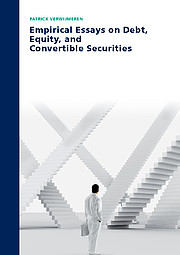Empirical Essays on Debt, Equity, and Convertible Securities Defended on Thursday, 18 December 2008
This dissertation consists of four empirical studies on firms’ financing decisions. In the first two studies, we investigate the debt-equity choice for a large number of U.S. firms. We find that firms prefer debt financing over equity financing in case a debt issue allows the firm to keep its investment grade rating. When the financing requirement becomes sufficiently large, firms are more likely to choose equity financing. We find that most firms repurchase debt instead of equity in case they have excess funds. The last two studies of this dissertation deal with convertible security design. Since convertible securities combine debt and equity characteristics, the specific structure of these instruments can provide further insight into the relevant costs and benefits of debt and equity. We find that taxes, the costs of refinancing, and the costs of managerial discretion are important drivers of convertible security design. We further find that the desire to manage earnings has been responsible for recent innovations in the convertible market. Convertible arbitrage drives the innovation of combining a convertible issue with a stock repurchase: the stock repurchase serves to mitigate the negative price impact that results from the short sales of arbitrageurs.
Keywords
corporate finance, capital structure, financing decisions, pecking order theory, static tradeoff theory, debt capacity, convertible securities, convertible design, earnings management, convertible arbitrage, stock repurchases













